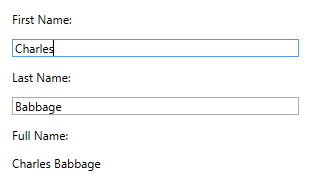Your typical MVVM framework requires you to raise property changed events. Assisticant is more thoughtful. She figures out when the UI needs to be updated. You just write your code. She intelligently follows your logic and raises property changed and collection changed events exactly when she should.
Typical MVVM
public class PersonViewModel : ViewModelBase { private string _first; private string _last; public string First { get => _first; set { _first = value; RaisePropertyChanged(() => First); RaisePropertyChanged(() => Full); } } public string Last { get => _last; set { _last = value; RaisePropertyChanged(() => Last); RaisePropertyChanged(() => Full); } } public string Full => First + " " + Last; }
Assisticant
public class PersonViewModel { private Observable<string> _first = new Observable<string>(); private Observable<string> _last = new Observable<string>(); public string First { get => _first.Value; set => _first.Value = value; } public string Last { get => _last.Value; set => _last.Value = value; } public string Full => First + " " + Last; }
The Result

Assisticant will even discover dependencies across object boundaries. You don't need to subscribe to events.
Typical MVVM
public class PersonModel : ObservableBase { private string _first; private string _last; public string First { get => _first; set { _first = value; RaisePropertyChanged(() => First); } } public string Last { get => _last; set { _last = value; RaisePropertyChanged(() => Last); } } }
Assisticant
public class PersonModel { private Observable<string> _first = new Observable<string>(); private Observable<string> _last = new Observable<string>(); public string First { get => _first.Value; set => _first.Value = value; } public string Last { get => _last.Value; set => _last.Value = value; } }
public class PersonViewModel : ViewModelBase { private readonly PersonModel _person; public PersonViewModel(PersonModel person) { _person = person; _person.PropertyChanged += PersonPropertyChanged; } void PersonPropertyChanged( object sender, PropertyChangedEventArgs e) { if (e.PropertyName == "First") { RaisePropertyChanged(() => First); RaisePropertyChanged(() => Full); } else if (e.PropertyName == "Last") { RaisePropertyChanged(() => Last); RaisePropertyChanged(() => Full); } } public string First { get => _person.First; set => _person.First = value; } public string Last { get => _person.Last; set => _person.Last = value; } public string Full => _person.First + " " + _person.Last; }
public class PersonViewModel { private readonly PersonModel _person; public PersonViewModel(PersonModel person) { _person = person; } public string First { get => _person.First; set => _person.First = value; } public string Last { get => _person.Last; set => _person.Last = value; } public string Full => _person.First + " " + _person.Last; }
Because Assisticant can track dependencies across objects, you don't need to use a message bus to keep view models in sync with one another. Just move the shared state to an object that both view models depend upon.
Typical MVVM
public class PersonSelectorViewModel : ViewModelBase { private readonly Directory _directory; private readonly List<PersonViewModel> _people; private PersonViewModel _selectedPerson = null; public PersonSelectorViewModel( Directory directory) { _directory = directory; _people = _directory.GetPeople() .Select(person => new PersonViewModel { Id = person.Id, First = person.First, Last = person.Last }) .ToList(); } public IEnumerable<PersonViewModel> People => _people; public PersonViewModel SelectedPerson { get => _selectedPerson; set { if (_selectedPerson == value) return; _selectedPerson = value; RaisePropertyChanged(() => this.SelectedPerson); MessengerInstance.Send(new PersonSelected { PersonId = value.Id }); } } }
Assisticant
public class PersonSelectorViewModel { private readonly Directory _directory; private readonly List<PersonViewModel> _people; private readonly PersonSelectionModel _personSelection; public PersonSelectorViewModel( Directory directory, PersonSelectionModel personSelection) { _directory = directory; _personSelection = personSelection; _people = _directory.GetPeople() .Select(person => new PersonViewModel( _personSelection.SelectedPerson)) .ToList(); } public IEnumerable<PersonViewModel> People => _people; public PersonViewModel SelectedPerson { get => _people.FirstOrDefault(p => p.Person == _personSelection.SelectedPerson); set => _personSelection.SelectedPerson = value == null ? null : value.Person; } }
public class PersonDetailViewModel : ViewModelBase { private Directory _directory; private int _id; private string _first; private string _last; public PersonDetailViewModel() { _directory = new Directory(); MessengerInstance.Register<PersonSelected>(this, message => { var person = _directory.LoadSession(message.PersonId); _id = message.PersonId; First = person.First; Last = person.Last; }); } public string First { get => _first; set { if (value == _first) return; _first = value; RaisePropertyChanged(() => this.First); MessengerInstance.Send(new PersonNameChanged { PersonId = _id, First = value, Last = Last }); } } public string Last { get => _last; set { if (value == _last) return; _last = value; RaisePropertyChanged(() => this.Last); MessengerInstance.Send(new PersonNameChanged { PersonId = _id, First = First, Last = value }); } } }
public class PersonDetailViewModel { private readonly PersonSelectionModel _personSelection; public PersonDetailViewModel( PersonSelectionModel personSelection) { _personSelection = personSelection; } public string First { get => _personSelection.SelectedPerson?.First; set => if (_personSelection.SelectedPerson != null) _personSelection.SelectedPerson.First = value; } public string Last { get => _personSelection.SelectedPerson?.Last; set => if (_personSelection.SelectedPerson != null) _personSelection.SelectedPerson.Last = value; } }
public class PersonSelectionModel { private Observable<PersonModel> _selectedPerson = new Observable<PersonModel>(); public PersonModel SelectedPerson { get => _selectedPerson.Value; set => _selectedPerson.Value = value; } }

 Thoughtful, intelligent data binding
Thoughtful, intelligent data binding